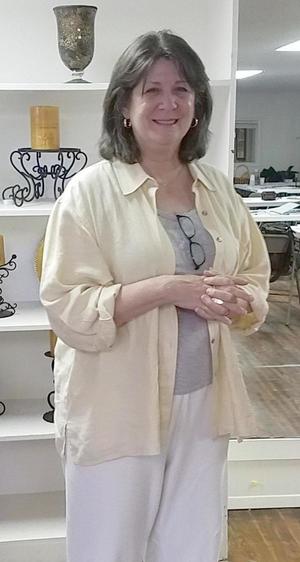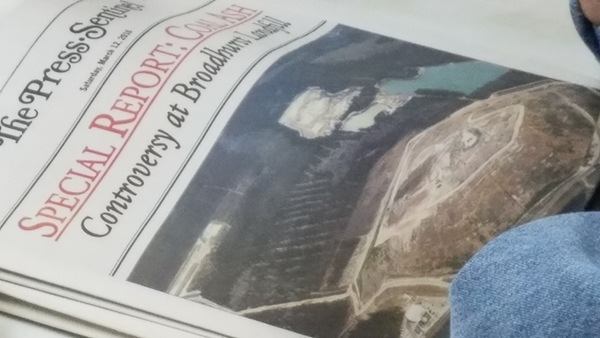The coal ash bills didn’t even get out of the HNRE Committee, which instead appointed a study committee. You can ask your Georgia House members to get on that committee.

Peggy Riggins Leslie Webb Riggins of No Ash At All in Valdosta 2017-03-01; photo by John S. Quarterman for WWALS.
Georgia Water Coalition, Press Release, 2 March 2017, Toxic Ash Dumping to remain secret; Georgia House Committee fails to vote on bills requiring community notification
Last year, Jesup residents found out that a landfill near their homes and wells leaked toxic metals found in coal ash into the soil and groundwater. The landfill company is proposing to make the landfill bigger and accept even more of the toxic waste.
“It felt like a punch in the gut,” said Peggy Riggins, Jesup resident. “We found out that toxins found in coal ash were underneath the landfill in our county. The government and the landfill knew for years before we were ever told. This is unacceptable. Our communities deserve to know about proposals to bring in toxic coal waste before its too late and has caused a problem.”
Mary Landers, SavannahNow, 2 March 2017, Lawmakers avoid public notice on coal ash dumping,
State lawmakers have thwarted an effort to require more public notification of local residents when coal ash is being dumped into nearby landfills or when the water from coal ash ponds is being dumped into nearby waterways.
The Georgia House Natural Resources and Environment committee took up the issues Thursday morning, focusing on two coal ash bills that Rep. Jeff Jones, R-Brunswick, stripped down and combined in an effort to address only the notification issue. Jones did so Thursday in an attempt to get the issue resolved as time runs out on this legislative session.
Friday is Crossover Day, the last day for bills to pass the chamber in which they were introduced and transfer to the other chamber for consideration.
Coal ash is the waste left over from burning coal. It contains heavy metals including mercury, cadmium and arsenic associated with cancer and other serious heath effects. Coal ash ponds are the holding pits used at power plants. Georgia Power is in the process of closing its ponds at sites across the state. Closure can include “dewatering” its ponds, a process that results in polluted water being drained into public waterways.
Jones told the committee that existing regulations and laws require only that the local governing authority be notified and only in the event of a release of toxic chemicals from a landfill. That setup wasn’t protective of Jesup, the south Georgia community that is facing the input of up to 10,000 tons per day of coal ash into the Broadhurst Landfill by Republic Waste. Last year, Jesup residents found out that Broadhurst had leaked toxic metals found in coal ash into the soil and groundwater.
In January, the Chattahoochee Riverkeeper learned from a state agency document review that Georgia Power had begun dewatering coal ash ponds at Atlanta’s Plant McDonough the previous month.
“Georgia Power is set to close 29 coal ash ponds all over the state, so we are only talking about 29, 30-day public notices,” said Jason Ulseth, Chattahoochee Riverkeeper in a press release from the Georgia Water Coalition. “At a minimum, the public deserves to know when toxic water will be discharged into the river so they can take appropriate precautions to protect the health of their families, crops, and livestock.”
GA-EPD’s response was not helpful:
EPD Director Rick Dunn said he’d look into it.
“We don’t do any announcements in legal organs or things like that. What we’d offered to Rep. Jones is make an announcement on our web site, which we think news would eventually filter down and get to folks through various people,” he said. “If the citizens themselves were not looking at the web sites themselves certainly advocacy groups, reporters and things like that would be looking at the site and the information would get down.”
Right, that worked so well for Valdosta’s wastewater situation.
EPD’s response was actually even less helpful:
“EPD’s response in committee was simply that we would examine whether current laws and regulations granted that authority,” EPD spokesman Kevin Chambers said later. “EPD was clear that it had the authority to provide public notice of receipt of these plans via its own website and was willing to do so.”
Notice “was willing to do so”, not “would do so”.
With that lukewarm response from EPD on requiring notification, committee chair Lynn Smith, R-Newnan, did not call for a vote and the bill remains in committee for the Crossover Day deadline Friday.
Chambers said it’s unclear when EPD would sort out if it has the authority to require permitees to give public notice.
“As this topic just arose this morning, we do not have a timeline at this point,” he said Thursday.
Just came up “this morning”? HB 387 and HB 388 were introduced February 15th 2017. I’m pretty sure notification was in the original versions of both bills.
So we’re back to the same old lack of laws we already head, in which no special permit or variance is permitted to dump coal ash in a landfill, such as the one in Lowndes County which already has coal ash in it from TVA and Florida, as wells as PCBs and wastewater from the Seven Out Superfund site in Waycross. Maybe more counties will pass local ordinances like Wayne County did in 2000.
-jsq, John S. Quarterman, Suwannee RIVERKEEPER®
You can join this fun and work by becoming a WWALS member today!
 Photo by John S. Quarterman for WWALS.
Photo by John S. Quarterman for WWALS.
Short Link:

I wish that these articles could be shared. We are working on the coal ash disposal in Georgia and would like to spread the word. Thank You –Water protectors of Georgia
People share them all the time. What seems to be the problem? -jsq
Pingback: Groups want coal ash regulation –VDT 2017-03-07 | WWALS Watershed Coalition (Suwannee RIVERKEEPER®)
Pingback: Videos: Sewage, Coal Ash, Historic Preservation, a dead cat, and turkeys @ VCC 2016-03-09 | On the LAKE front
Pingback: Videos: Coal ash at Valdosta City Council and Lowndes County Commission 2017-03-09-14 | WWALS Watershed Coalition (Suwannee RIVERKEEPER®)